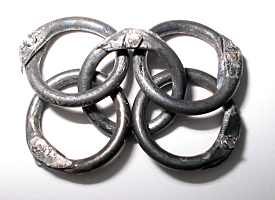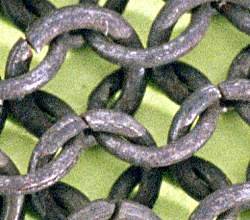Armor in the Middle Ages: Chainmail
Some people think protective chainmail looks like this

By greyloch from Washington, DC, area, U.S.A. (Chainmail bikini girl) [CC BY-SA 2.0]
And in this article I am going to try to change your mind.
History of chainmail
Chainmail was already in use when the Middle Ages started and looked more like this

Source
Chainmail was most of the time a shirt which at least covered the torso and the arms varied from tshirt length to full sleves. It was used from 400 BC to the late middle ages aka 1500 AD. This is almost 2000 years! People experimented with it and other types were tried but during this period people always came back to chainmail after a while. In the early Middle Ages other types of armour were put over the chainmail, like a coat of plates, lamellar or full plate but it stayed until the end of the Middle Ages.
How was chainmail used?
It was ALWAYS worn overtop of another garment. This could either be a thick woolen tunic or a gambeson. This garment was there to prevent your skin from making contact with the chainmail and also to dampen the impact of incoming blows. Chainmail was also used as a bottom layer of armour in plate armour and under a coat of plates. Under these armours it provided an aditional layer of protection against weapons with a high penetration power like arrows.
Why was it used?
Chainmail has a couple big plus points:
- It is flexible. This means that while is has its weight, it flexes like a fabric and does not significantly impede the users movement. It can also be put on withour help. This is compared to plate armour which is made out of solid plates and a full suit of which can never be put on without help.
- It is easy to repair. Chainmail is made a out of thousands of tiny rings. After a battle some might have been destroyed, but this is not the end of the world because you can, with a little practice, add new rings yourself. Other armours require a forge and training to beat out the demage to a steel breastplate
- Protection. While flexible, it provides excellent protection against cuts and moderate protction against trusts.
A couple of disadvantages are:
- Lack of protection. Chainmail is very bad in protecting its wearer againts: Blunt weapons like maces and warhammers and the force that other weapons deliver like the force behind the thrust with a spear. While it stopes any cut, it just flexes with the maces and does nothing to soften the blow. This is the reason why padded armour like a gambeson was worn underneath the mail. It would soften the blow by spreading the impact and it absorbed a part of the blow.
How was it made?
Chainmail is made out of rings formed from metal wire which are woven into a shirt.
Most of the European chainmail from the Middle Ages found is riveted. This means that the rings are closed with a little rivet after they have been woven into the pattern. This is seen in the first picture. In asia butted mail was used. Sadly enough this butted mail is what is used in movies nowadays and it is also featured in some videos which "test the strenght of chainmail" while butted mail is much weaker than its riveted counterpart.


Source
What factors were important when making the mail?
- linkage type: riveted or butted. Riveted is way stronger that butted, but also takes more time to make.
- Material: Iron or steel. Steel is harder and more stable than iron, but takes more time to make.
- Weave density: more rings per area means smaller rings, more time to make and better protection against piersing weapons like arrows.
- Ring thickness: Thicker rings means heaviers shirt, but tougher to pierce.
Conclusion
Chainmail was used a long time and was very effective in protecting its wearers. This is supported by archiological finds which show more blows to bodyparts which were not covered in chainmail than ones who were. Chainmail is not some useless form of clothing like some movies portray it to be and can not simply be pierced or destroyed with a normal weapon.
Thanks for your attention to my first real post on steemit. I appreciate it a lot!
Sources:
Wikipedia: Mail
Swweet. Here's one of my posts for your upvoting pleasure Blessed Be!
https://steemit.com/honeymoon/@kalaylah77/ever-been-on-a-cruise-what-s-one-thing-you-wish-you-brought-that-you-d-deff-remember-for-nextime
amazing